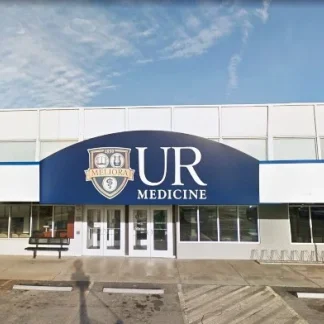DePaul - Halstead Square Community Residence
DePaul - Halstead Square Community Residence provides housing in a service-enric...
Strong Ties Clinic - Community Support Programs, located in Rochester, New York, offers behavioral healthcare and mental health treatment to individuals located throughout the county. If addiction is the primary diagnosis, clients may need to be referred to an alcohol or drug rehab center.
Strong Ties Clinic – Community Support Programs treats a wide variety of life challenges, including dual diagnosis. Their programming is offered on an outpatient basis.
Outpatient Treatment The outpatient program provides psychiatric care and evidence-based treatment interventions. It also offers medication review and treatment, individual therapy, group therapy, and non 12-Step self-help groups.
Private Insurance Strong Ties Clinic – Community Support Programs accepts most insurance plans, including Aetna, Anthem, Blue Cross/Blue Shield, Humana, and Ambetter. Out of network benefits can vary, and clients are encouraged to check with their insurance provider to determine benefits.
Contact us for more information: (585) 279-4900

Connect with Strong Ties Clinic - Community Support Programs by calling their admissions team directly.
(585) 279-4900 Website Get DirectionsCognitive Behavioral Therapy (CBT) is a therapy modality that focuses on the relationship between one's thoughts, feelings, and behaviors. It is used to establish and allow for healthy responses to thoughts and feelings (instead of unhealthy responses, like using drugs or alcohol). CBT has been proven effective for recovering addicts of all kinds, and is used to strengthen a patient's own self-awareness and ability to self-regulate. CBT allows individuals to monitor their own emotional state, become more adept at communicating with others, and manage stress without needing to engage in substance abuse.
Dialectical Behavior Therapy (DBT) is a modified form of Cognitive Behavioral Therapy (CBT), a treatment designed to help people understand and ultimately affect the relationship between their thoughts, feelings, and behaviors. DBT is often used for individuals who struggle with self-harm behaviors, such as self-mutilation (cutting) and suicidal thoughts, urges, or attempts. It has been proven clinically effective for those who struggle with out-of-control emotions and mental health illnesses like Borderline Personality Disorder.
Group therapy is any therapeutic work that happens in a group (not one-on-one). There are a number of different group therapy modalities, including support groups, experiential therapy, psycho-education, and more. Group therapy involves treatment as well as processing interaction between group members.
In individual therapy, a patient meets one-on-one with a trained psychologist or counselor. Therapy is a pivotal part of effective substance abuse treatment, as it often covers root causes of addiction, including challenges faced by the patient in their social, family, and work/school life.
Dialectical Behavior Therapy (DBT) is a modified form of Cognitive Behavioral Therapy (CBT), a treatment designed to help people understand and ultimately affect the relationship between their thoughts, feelings, and behaviors. DBT is often used for individuals who struggle with self-harm behaviors, such as self-mutilation (cutting) and suicidal thoughts, urges, or attempts. It has been proven clinically effective for those who struggle with out-of-control emotions and mental health illnesses like Borderline Personality Disorder.
Group therapy is any therapeutic work that happens in a group (not one-on-one). There are a number of different group therapy modalities, including support groups, experiential therapy, psycho-education, and more. Group therapy involves treatment as well as processing interaction between group members.
In individual therapy, a patient meets one-on-one with a trained psychologist or counselor. Therapy is a pivotal part of effective substance abuse treatment, as it often covers root causes of addiction, including challenges faced by the patient in their social, family, and work/school life.
Group therapy is any therapeutic work that happens in a group (not one-on-one). There are a number of different group therapy modalities, including support groups, experiential therapy, psycho-education, and more. Group therapy involves treatment as well as processing interaction between group members.
In individual therapy, a patient meets one-on-one with a trained psychologist or counselor. Therapy is a pivotal part of effective substance abuse treatment, as it often covers root causes of addiction, including challenges faced by the patient in their social, family, and work/school life.
In individual therapy, a patient meets one-on-one with a trained psychologist or counselor. Therapy is a pivotal part of effective substance abuse treatment, as it often covers root causes of addiction, including challenges faced by the patient in their social, family, and work/school life.
DePaul - Halstead Square Community Residence provides housing in a service-enric...
Catholic Family Center is a faith based social services organization offering su...
East House is a private, nonprofit rehabilitation agency. East House - Boehm Lod...
Blake House is a rehab facility located in Rochester, NY. Blake House specialize...